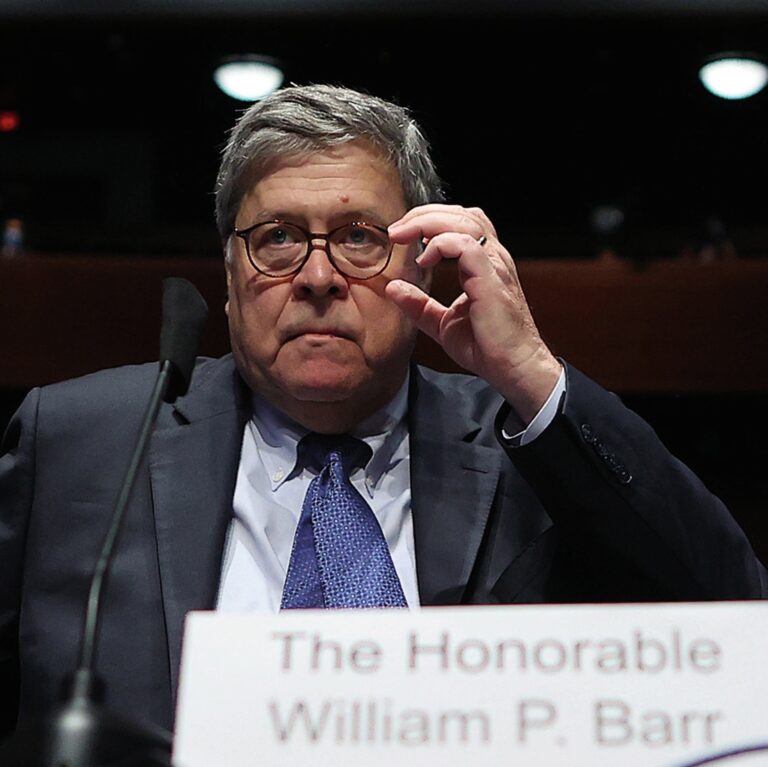One authority who used both phrases was Bill Barr, Attorney General of the United States twice, under George H. W. Bush in the early 1990s and then under Donald Trump from early 2019 to late December 2020. Speaking with the economics and political commentator Larry Kudlow, Barr described the indictment as “an abomination, the epitome of the abuse of prosecutorial power.”
Barr went on to observe that Bragg was “going after the man not a crime,” a procedure that I have elsewhere compared to “bills of attainder,” a deprecated legal tactic that was prohibited by the U.S. Constitution because they targeted not specific crimes but specific people. The English used and abused such instruments. The colonists wanted no part of a process that deprived certain individuals of their civil rights and transformed them into pariahs because they fell afoul of powerful people.
As most of my readers will know, Bill Barr, despite having worked for Donald Trump, has a complicated relationship with the former president. He disapproved of Trump’s behavior following the 2020 election and left office shortly before the end of Trump’s first term. So the forthright, no-holds-barred nature of Barr’s criticism of the indictment is all the more noteworthy. By mobilizing the coercive power of the legal system to effect the political process, he said, the indictment marked “a shameful episode in our history” that we will forever “rue” (this is where crossing the Rubicon came in).
Asked by Kudlow how he thought the rest of the world regarded the indictment (the details of which are still under seal), Barr said it made the United States look like “a banana republic.” In such corrupt polities, the ruling party intimidates, persecutes, and prosecutes rival parties and anyone who challenges its prerogatives. This is a truth that Nayib Bukele, the robust president of El Salvador, underscored in his response to a chortling piece in The New York Times. Embracing the news of Trump’s indictment, The Times speculated joyfully about what was going to happen to the former president during his arraignment: “He will be fingerprinted. He will be photographed. He may even be handcuffed.” “Imagine,” Bukele tweeted, “if this happened to a leading opposition presidential candidate here in El Salvador.”
It would be a mistake, I think, to regard William Barr’s comments as a pro-Trump manifesto. They are anti prosecutorial abuse, which may in this case serve to aid the former president. Indeed, Trump is soaring in the polls post-indictment, and he is also raking in campaign donations by the truckload.
Barr, like other commentators, speculated that the real goal of this unprecedented step by the the Democrats was twofold, first, to inject chaos into the process of the GOP primary, and, second, to help Trump in polls.
That second goal might seem to be surprising, since Democrats to a man (along with many Republicans) abominate Trump and want him exiled from the metabolism of American political life altogether. Those might seem like contradictory impulses, but the governing supposition is that Trump would be easier to beat than some other candidates, notably Florida governor Ron DeSantis. So the strategy is simultaneously to taint Trump with the voters at large while also whipping up his base and, indeed, other Republicans generally who see the indictment as the weaponization of the legal process for purely partisan political ends.
I suspect Democrats may be underestimating the potency of Trump’s brand. A few weeks ago, when Trump first broached the news that was likely soon to be arrested, Elon Musk tweeted that, should Trump really be arrested, he would win the 2024 election “in a landslide victory.” Careful readers will have noted that I spoke above of Trump’s “first term.” That implied that I think there will likely be a second term, as indeed I do.
I began this column by mentioning the phrases “crossing the Rubicon” and “banana republic.” I will end by reminding those gleefully celebrating over Donald Trump’s legal difficulties of another word, one used recently by Trump himself. The word is “retribution.”
